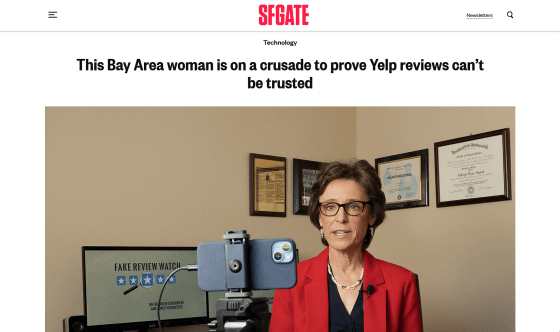A record of a woman who fights against fraudulent groups that perform acts such as ``posting fake reviews with rewards of 10,000 yen or more'' and ``threatening users with 1 star reviews''

Many people refer to user reviews posted online when purchasing products online or looking for restaurants in town. However, it is said that ``
Bay Area woman on a crusade to prove Yelp reviews can't be trusted
https://www.sfgate.com/tech/article/yel-review-fraud-kay-dean-18150617.php

Yelp , a review site founded in San Francisco in 2004, posts user reviews about various stores and companies. A huge number of user reviews are posted on Yelp every day, and partnerships with services such as Apple Maps are now deeply rooted in American consumer habits. However, reviews posted on Yelp are not necessarily useful, and there are also 'fake reviews' posted systematically.
One day in 2017, Kay Dean, who lives in San Jose , California, received a letter from a psychiatric clinic called SavantCare, which posted a 1-star review on Yelp, saying, 'If you don't remove the negative review, I'll sue you.' Mr. Dean, who once worked as an inspector general for the United States Department of Education, said he was suspicious of this letter he received from SavantCare and embarked on an investigation.
Mr. Dean checked various reviews posted on SavantCare. As a result, a person named ``Melissa R.'' said, ``I was offered money to leave a positive review from SavantCare. I found

Further research revealed that reviewers posting positive reviews on SavantCare were members of a Facebook-connected 'review group.' There are multiple Facebook groups that post these fake reviews, and they receive money instead of posting positive fake reviews on Yelp and Google.
When Mr. Dean actually created a fake account on Facebook and joined the group, he received an offer to ``give a reward instead of posting a positive review of about 150 words about SavantCare''.
Dean created a list of reviewers who had posted positive reviews on SavantCare and looked for 'suspicious patterns' in the other reviews they posted. As a result, 10 of the 17 reviewers on SavantCare were from the same dental clinic in Los Angeles, 9 from the same DJ company in California, and 5 from the same tattoo shop in Mountain View. It turns out that 5 more people have posted reviews for the same mover in Florida.
Mr. Dean compiled this evidence and forwarded it to the Santa Clara County District Attorney's Office, and filed a small claims action against SavantCare for receiving the threatening letter, claiming in March 2018 'emotional distress caused by negligence.' I succeeded in receiving a compensation of $ 275 (about 30,000 yen at the rate at that time) for 'infringement of'. In addition, when I contacted the lawyer mentioned in the letter, the lawyer himself did not remember signing the letter, and it was discovered that SavantCare borrowed his name and signature without permission.
And in March 2020, the Santa Clara County District Attorney's Office charged former SavantCare CEO Vikas Kedia with three felonies and two misdemeanors, including 'unauthorized use of personal information' and 'unauthorized legal conduct.' . Kedia, whose next hearing is scheduled for June 21, 2023, did not respond to SFGATE's inquiry.

Mr. Dean continues to work as a citizen investigator even after the SavantCare issue has been resolved to raise awareness about the problem of fake reviews and review groups. Mr. Dean, who infiltrated the Facebook review group, received $100 (about 14,000 yen) from users of Yelp Elites, which are certified by Yelp that business owners and brokers post high-quality reviews. I've also made sure that I'm buying good reviews. Yelp Elites reviews are likely to be prioritized by the platform's recommendation algorithm and are highly effective as reviews.
When checking fake reviews posted by users of Yelp Elites, Dean said that in some cases, they were reprinted from other web services such as TripAdvisor, and in some cases the photos attached to the builder's review were from stock sites. points out.
A business owner who spoke with Mr. Dean said that he received a threat from a Yelp user, ``I posted a fake star 1 review on your store, but if you pay me, I will rewrite it as a star 5 review.'' Business owners can't choose to 'hide reviews from being posted on Yelp', so they can't hide fake 1-star reviews even if they're posted because of blackmail.

At some point, Yelp also took steps to remove the fake reviews and suspicious users that Dean introduced in the video, but there are still many fraudulent users who are still active. Mr. Dean criticized Yelp's response as ad hoc and criticized that it should actively crack down on fake reviews as a responsibility of a billion dollar (140 billion yen) technology company.
A Yelp spokesperson told SFGATE that the company is an industry leader in cracking down on fake reviews. 'Yelp invests heavily in technology and human moderation to protect the integrity and quality of content on our platform, and we actively investigate attempts to deceive our users,' it said. However, Dean points out that Yelp may dare to avoid cracking down on fake reviews because positive reviews of companies themselves may increase Yelp's value.
Online reviews are now becoming unreliable due to the surge in fake reviews and the advent of AI-generated reviews associated with the epidemic of the new coronavirus infection (COVID-19). “Online review platforms are really clever innovations that started out as a boon to consumers,” said Dean. “But I think tech companies have created a real Frankenstein monster. It's just out of control.'
Related Posts:
in Web Service, Posted by log1h_ik







